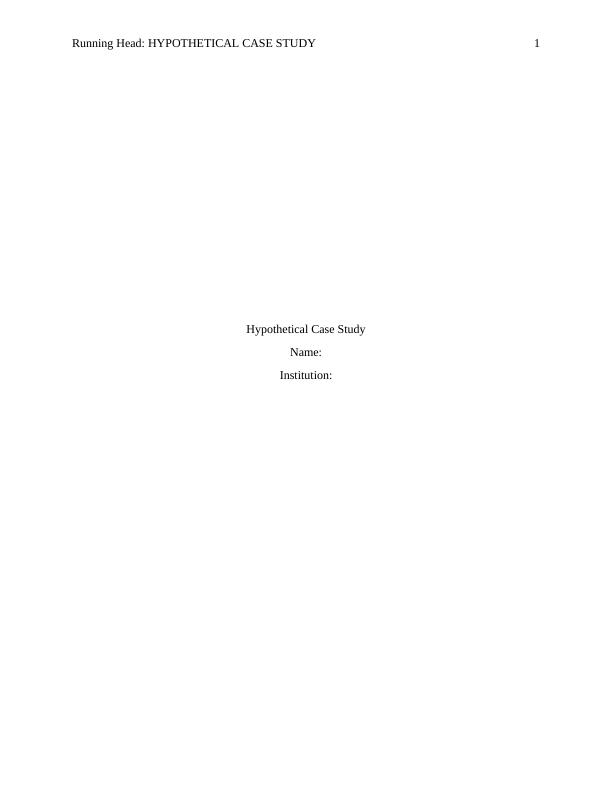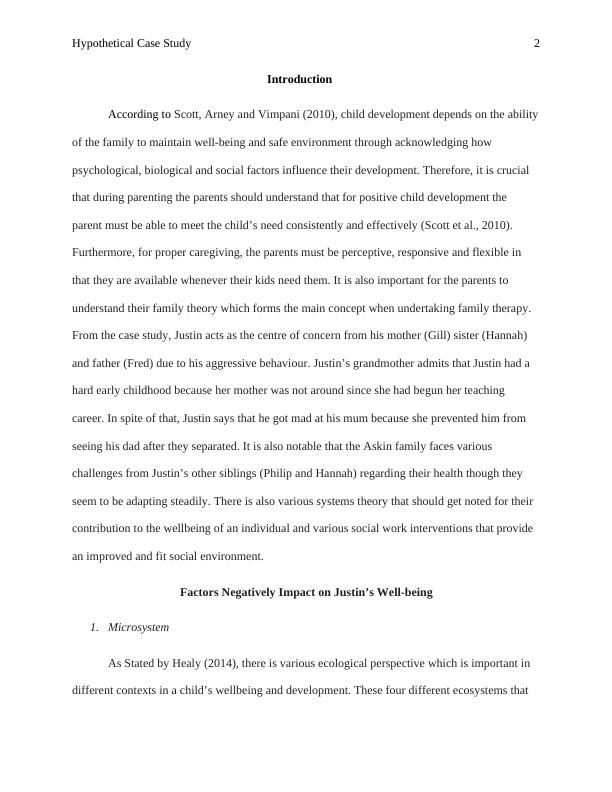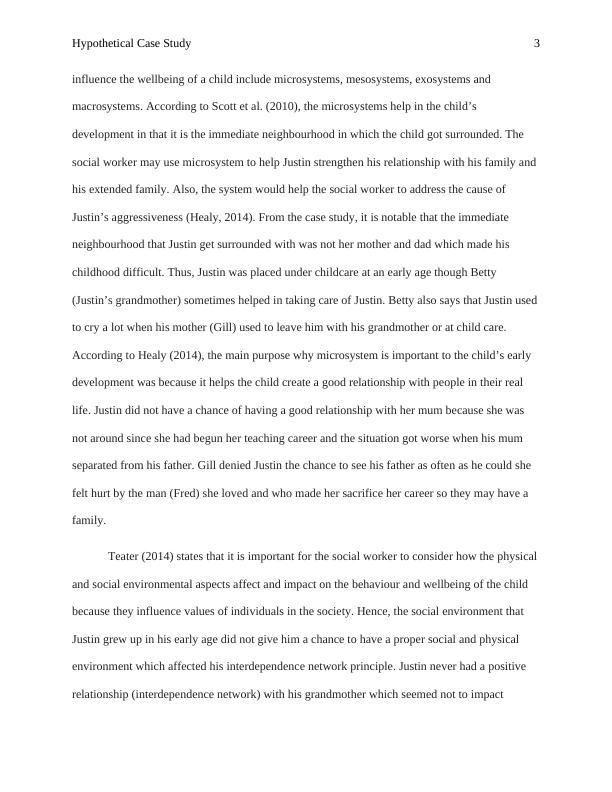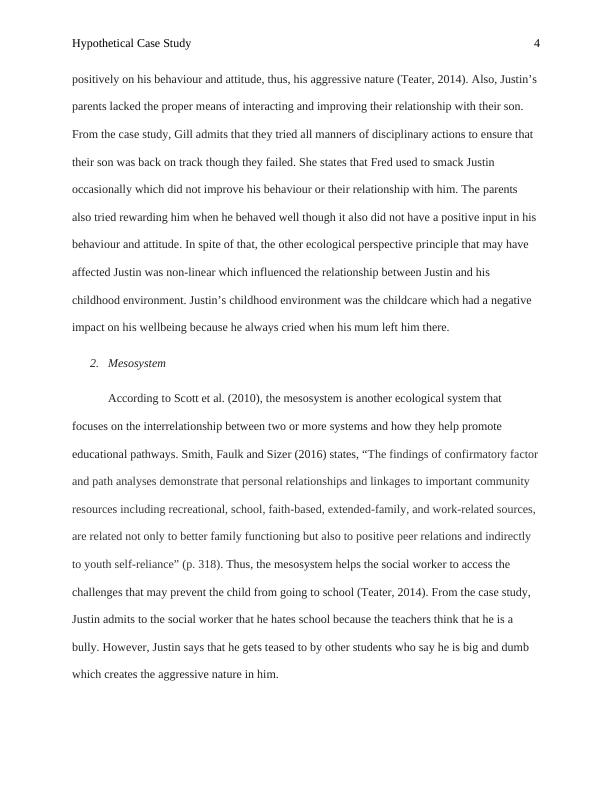Hypothetical Case Study on Child Development and Ecological Perspective
Added on 2023-06-04
11 Pages2922 Words403 Views
Running Head: HYPOTHETICAL CASE STUDY 1
Hypothetical Case Study
Name:
Institution:
Hypothetical Case Study
Name:
Institution:

Hypothetical Case Study 2
Introduction
According to Scott, Arney and Vimpani (2010), child development depends on the ability
of the family to maintain well-being and safe environment through acknowledging how
psychological, biological and social factors influence their development. Therefore, it is crucial
that during parenting the parents should understand that for positive child development the
parent must be able to meet the child’s need consistently and effectively (Scott et al., 2010).
Furthermore, for proper caregiving, the parents must be perceptive, responsive and flexible in
that they are available whenever their kids need them. It is also important for the parents to
understand their family theory which forms the main concept when undertaking family therapy.
From the case study, Justin acts as the centre of concern from his mother (Gill) sister (Hannah)
and father (Fred) due to his aggressive behaviour. Justin’s grandmother admits that Justin had a
hard early childhood because her mother was not around since she had begun her teaching
career. In spite of that, Justin says that he got mad at his mum because she prevented him from
seeing his dad after they separated. It is also notable that the Askin family faces various
challenges from Justin’s other siblings (Philip and Hannah) regarding their health though they
seem to be adapting steadily. There is also various systems theory that should get noted for their
contribution to the wellbeing of an individual and various social work interventions that provide
an improved and fit social environment.
Factors Negatively Impact on Justin’s Well-being
1. Microsystem
As Stated by Healy (2014), there is various ecological perspective which is important in
different contexts in a child’s wellbeing and development. These four different ecosystems that
Introduction
According to Scott, Arney and Vimpani (2010), child development depends on the ability
of the family to maintain well-being and safe environment through acknowledging how
psychological, biological and social factors influence their development. Therefore, it is crucial
that during parenting the parents should understand that for positive child development the
parent must be able to meet the child’s need consistently and effectively (Scott et al., 2010).
Furthermore, for proper caregiving, the parents must be perceptive, responsive and flexible in
that they are available whenever their kids need them. It is also important for the parents to
understand their family theory which forms the main concept when undertaking family therapy.
From the case study, Justin acts as the centre of concern from his mother (Gill) sister (Hannah)
and father (Fred) due to his aggressive behaviour. Justin’s grandmother admits that Justin had a
hard early childhood because her mother was not around since she had begun her teaching
career. In spite of that, Justin says that he got mad at his mum because she prevented him from
seeing his dad after they separated. It is also notable that the Askin family faces various
challenges from Justin’s other siblings (Philip and Hannah) regarding their health though they
seem to be adapting steadily. There is also various systems theory that should get noted for their
contribution to the wellbeing of an individual and various social work interventions that provide
an improved and fit social environment.
Factors Negatively Impact on Justin’s Well-being
1. Microsystem
As Stated by Healy (2014), there is various ecological perspective which is important in
different contexts in a child’s wellbeing and development. These four different ecosystems that

Hypothetical Case Study 3
influence the wellbeing of a child include microsystems, mesosystems, exosystems and
macrosystems. According to Scott et al. (2010), the microsystems help in the child’s
development in that it is the immediate neighbourhood in which the child got surrounded. The
social worker may use microsystem to help Justin strengthen his relationship with his family and
his extended family. Also, the system would help the social worker to address the cause of
Justin’s aggressiveness (Healy, 2014). From the case study, it is notable that the immediate
neighbourhood that Justin get surrounded with was not her mother and dad which made his
childhood difficult. Thus, Justin was placed under childcare at an early age though Betty
(Justin’s grandmother) sometimes helped in taking care of Justin. Betty also says that Justin used
to cry a lot when his mother (Gill) used to leave him with his grandmother or at child care.
According to Healy (2014), the main purpose why microsystem is important to the child’s early
development was because it helps the child create a good relationship with people in their real
life. Justin did not have a chance of having a good relationship with her mum because she was
not around since she had begun her teaching career and the situation got worse when his mum
separated from his father. Gill denied Justin the chance to see his father as often as he could she
felt hurt by the man (Fred) she loved and who made her sacrifice her career so they may have a
family.
Teater (2014) states that it is important for the social worker to consider how the physical
and social environmental aspects affect and impact on the behaviour and wellbeing of the child
because they influence values of individuals in the society. Hence, the social environment that
Justin grew up in his early age did not give him a chance to have a proper social and physical
environment which affected his interdependence network principle. Justin never had a positive
relationship (interdependence network) with his grandmother which seemed not to impact
influence the wellbeing of a child include microsystems, mesosystems, exosystems and
macrosystems. According to Scott et al. (2010), the microsystems help in the child’s
development in that it is the immediate neighbourhood in which the child got surrounded. The
social worker may use microsystem to help Justin strengthen his relationship with his family and
his extended family. Also, the system would help the social worker to address the cause of
Justin’s aggressiveness (Healy, 2014). From the case study, it is notable that the immediate
neighbourhood that Justin get surrounded with was not her mother and dad which made his
childhood difficult. Thus, Justin was placed under childcare at an early age though Betty
(Justin’s grandmother) sometimes helped in taking care of Justin. Betty also says that Justin used
to cry a lot when his mother (Gill) used to leave him with his grandmother or at child care.
According to Healy (2014), the main purpose why microsystem is important to the child’s early
development was because it helps the child create a good relationship with people in their real
life. Justin did not have a chance of having a good relationship with her mum because she was
not around since she had begun her teaching career and the situation got worse when his mum
separated from his father. Gill denied Justin the chance to see his father as often as he could she
felt hurt by the man (Fred) she loved and who made her sacrifice her career so they may have a
family.
Teater (2014) states that it is important for the social worker to consider how the physical
and social environmental aspects affect and impact on the behaviour and wellbeing of the child
because they influence values of individuals in the society. Hence, the social environment that
Justin grew up in his early age did not give him a chance to have a proper social and physical
environment which affected his interdependence network principle. Justin never had a positive
relationship (interdependence network) with his grandmother which seemed not to impact

Hypothetical Case Study 4
positively on his behaviour and attitude, thus, his aggressive nature (Teater, 2014). Also, Justin’s
parents lacked the proper means of interacting and improving their relationship with their son.
From the case study, Gill admits that they tried all manners of disciplinary actions to ensure that
their son was back on track though they failed. She states that Fred used to smack Justin
occasionally which did not improve his behaviour or their relationship with him. The parents
also tried rewarding him when he behaved well though it also did not have a positive input in his
behaviour and attitude. In spite of that, the other ecological perspective principle that may have
affected Justin was non-linear which influenced the relationship between Justin and his
childhood environment. Justin’s childhood environment was the childcare which had a negative
impact on his wellbeing because he always cried when his mum left him there.
2. Mesosystem
According to Scott et al. (2010), the mesosystem is another ecological system that
focuses on the interrelationship between two or more systems and how they help promote
educational pathways. Smith, Faulk and Sizer (2016) states, “The findings of confirmatory factor
and path analyses demonstrate that personal relationships and linkages to important community
resources including recreational, school, faith-based, extended-family, and work-related sources,
are related not only to better family functioning but also to positive peer relations and indirectly
to youth self-reliance” (p. 318). Thus, the mesosystem helps the social worker to access the
challenges that may prevent the child from going to school (Teater, 2014). From the case study,
Justin admits to the social worker that he hates school because the teachers think that he is a
bully. However, Justin says that he gets teased to by other students who say he is big and dumb
which creates the aggressive nature in him.
positively on his behaviour and attitude, thus, his aggressive nature (Teater, 2014). Also, Justin’s
parents lacked the proper means of interacting and improving their relationship with their son.
From the case study, Gill admits that they tried all manners of disciplinary actions to ensure that
their son was back on track though they failed. She states that Fred used to smack Justin
occasionally which did not improve his behaviour or their relationship with him. The parents
also tried rewarding him when he behaved well though it also did not have a positive input in his
behaviour and attitude. In spite of that, the other ecological perspective principle that may have
affected Justin was non-linear which influenced the relationship between Justin and his
childhood environment. Justin’s childhood environment was the childcare which had a negative
impact on his wellbeing because he always cried when his mum left him there.
2. Mesosystem
According to Scott et al. (2010), the mesosystem is another ecological system that
focuses on the interrelationship between two or more systems and how they help promote
educational pathways. Smith, Faulk and Sizer (2016) states, “The findings of confirmatory factor
and path analyses demonstrate that personal relationships and linkages to important community
resources including recreational, school, faith-based, extended-family, and work-related sources,
are related not only to better family functioning but also to positive peer relations and indirectly
to youth self-reliance” (p. 318). Thus, the mesosystem helps the social worker to access the
challenges that may prevent the child from going to school (Teater, 2014). From the case study,
Justin admits to the social worker that he hates school because the teachers think that he is a
bully. However, Justin says that he gets teased to by other students who say he is big and dumb
which creates the aggressive nature in him.

End of preview
Want to access all the pages? Upload your documents or become a member.
Related Documents
MSWPG 7107 Social Work With Children, Young People and Familieslg...
|11
|2864
|234
Social Work with Children, Young People and Families: A Case Study Analysislg...
|8
|2495
|100
Social Work Practicelg...
|7
|2472
|60
Social Practices with Childrenlg...
|8
|2053
|205
Mediating Custody Arrangements for Children: A Child-Focus Approachlg...
|5
|1603
|410
